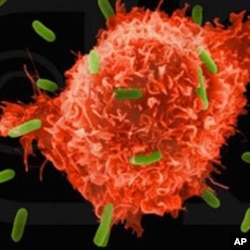Medical problems in 1911 are still with us a century later. In its New Year issue The British medical journal The Lancet looks back 100 years in medical history to put the state of medicine today in sharper focus. In 1911 Lancet editors celebrated advances against rabies, diphtheria and the bubonic plague. They also lamented the slow progress in controlling the spread of tuberculosis, then an often fatal disease. According to the World Health Organization TB remains a major public health problem in 2011 with one-third of the world infected with the microbe. About 1.7 million people died from TB in 2009, and new drug-resistant strains are emerging.
Rapid TB Diagnostic Test
Lancet Executive Editor Bill Summerskill is cautiously optimistic about the development of a new TB diagnostic tool. "One of the highlights of 2010 was getting a quicker test for diagnosis than previously, because diagnosis had taken a while and was one of the weak links in identifying people at risk and starting them on appropriate treatment." Summerskill says that means people at high risk for TB, like those with HIV/AIDS, can be tested and treated sooner, which can help break the dangerous chain of transmission.
Egg Safety Echoes Century-old Concern
Food safety was another prominent subject in the Lancet 100 years ago, with a story on a public health campaign in New York against vendors selling rotten eggs. Summerskill says the new U.S. food safety bill signed into law on January 4 was in part a response to the sickening of 1500 Americans last August from salmonella-tainted eggs, which resulted in 550 million eggs being pulled off the market.
Other articles in the 19ll edition of the Lancet focused on syphilis, a sexually-transmitted disease, and cancer. Treatments for syphilis and other STDs have improved dramatically over the past century, but cancer has proved a far more intractable disease. Today, cancer is the leading cause of death worldwide. Still, survival rates for many forms of cancer are on the rise, and new treatments are commonly in the news.
Aspirin at Low Dose Helps Cut Cancer Risk
A paper in the current Lancet discusses aspirin as an intervention that can help reduce the risk of colorectal and other cancers if taken at a low dose once a day over time. Lancet's Executive Editor Bill Summerskill says looking at the timeline of the past century reveals how scientists have worked slowly, doggedly, and successfully to develop new treatments and drugs to fight a variety of cancers and dangerous microbial infections. He adds that mapping the human genome holds promise for even more targeted treatments. "I think that there is still anticipation that there are secrets that it will unlock and there will be directly transferable benefits," he says.
As Summerskill compares medical research from 1911 with 2011, he notes one fundamental change. "When you look through the journals, although the prose is eloquent and delightful to read, the science is not what one would expect today. If you looked at a medical journal today, we have good solid science at the heart of research. It is peer reviewed. It is reported according to standardized guidelines, and I think that will form the basis for good evidenced decisions in the future."
Lancet's New Year editorial concludes: "Between 1911 and 2011 there is much for medicine to be proud of and also be humble about. New years bring new promise and new opportunities, but some old demons remain."






